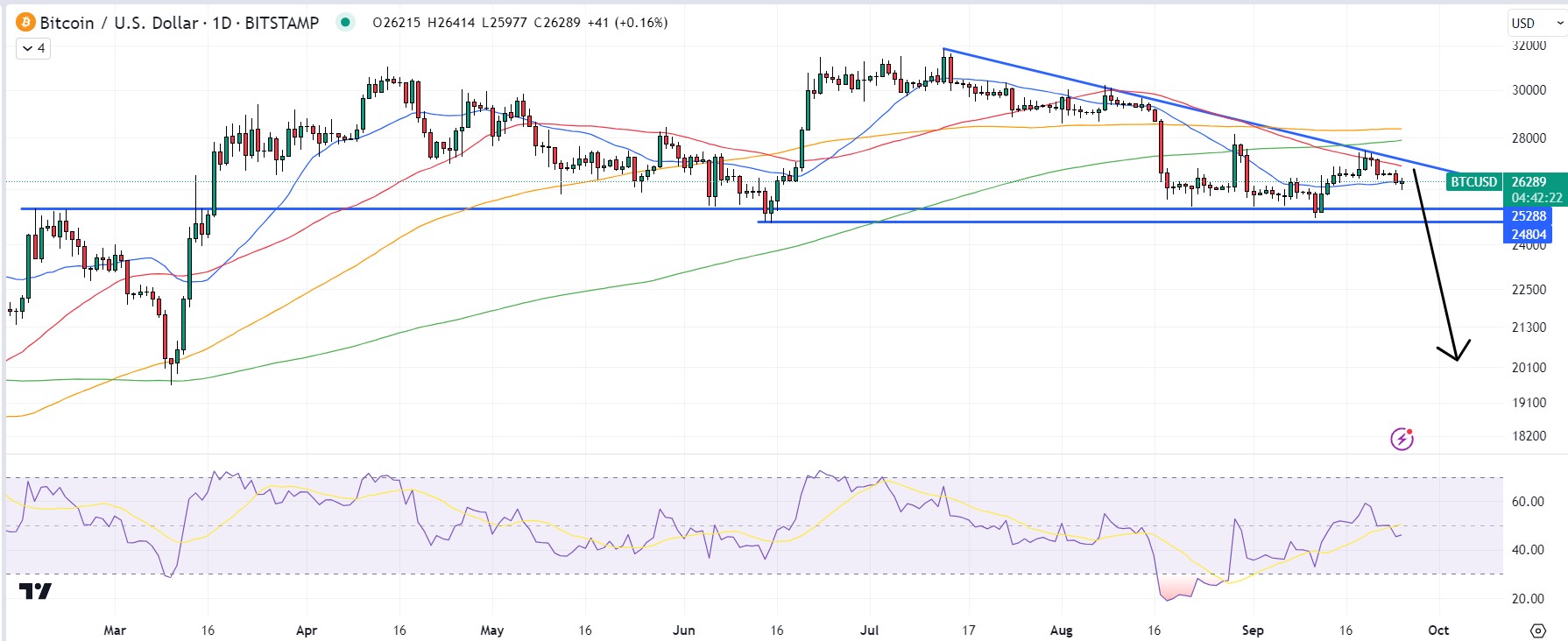Bitcoin (BTC) is set to end the third quarter of 2023 with losses of around 15%, its worst quarterly performance since the final quarter of 2022, when the cryptocurrency also lost 15%, as per currencyrush.com.
The world’s largest cryptocurrency by market capitalization, which had a market of around $513 billion as of the 25th of September, was last trading in the low $26,000s, around 17% below its summer 2023 highs in the upper $31,000s.
Macro Headwinds
BTC has been weighed in Q3 amid a rise in US bond yields and the US dollar due to rising bets that the US Federal Reserve will hold interest rates at higher levels for longer.
US economic data has surprised to the upside throughout Q3, with survey-based measures of economic growth and the labor market metrics holding up better than expected, leading to traders dialling down their bets for a US recession.
At last week’s policy announcement, the Fed warned it may still raise rates again this year, and projected less rate cuts in 2024 than it had one quarter earlier.
Rising bond yields and a stronger US dollar are a headwinds for Bitcoin – higher yields on US government debt (considered a risk-free safe haven asset) reduce the incentive to hold risk-sensitive non-yielding assets like Bitcoin, while a stronger dollar makes USD-denominated Bitcoin more expensive for foreign investors.
As institutional adoption rises – a trend that is set to accelerate in the coming quarters as spot Bitcoin ETFs gain approval – Bitcoin is undoubtedly set to become even more sensitive to broader macro conditions.
A policy shift at major central banks towards rate cuts rather than rate hikes will likely thus be a key driver of future BTC bull markets.
And the rate cut narrative might not start taking hold until 2024.
2024 Bull Market?
Another key narrative that many investors are expecting to boost BTC in 2024 is the halving, currently expected to take place next April.
Halvings – where the Bitcoin issuance rate drops in half – have historically been bullish catalysts that have eventually driven a rise back to all-time highs for Bitcoin.
Assuming the halving coincides roughly with the start of a Fed/global central bank rate cutting cycle as well as other potentially bullish catalysts such as 1) spot Bitcoin ETF approvals in the US and 2) more regulatory clarity from Congress, or from current SEC/crypto firm lawsuits, 2024 could be the start of a major new BTC bull market.
Where Next for Bitcoin (BTC)?
2024 could be a big year for Bitcoin.
But things could remain choppy and indecisive in the short term.
According to data presented by The Block, BTC options investors are expecting near-term price downside, with Bitcoin 7 and 30-day 25% delta skews in negative territory.

That means investors are paying more for Bitcoin options that pay out if the price falls over the next 7 and 30 days, versus equivalent options that pay out if the price rises.
Technicals also look concerning.
Bitcoin is threatening a break below a long-term pennant structure, which could open the door for a drop all the way back to $20,000.
Of course, given the good outlook for 2024, longer-term investors would likely look at a drop to these levels as a good opportunity to accumulate.
But in the near-term, conditions look set to remain difficult.
Bitcoin (BTC) is set to end the third quarter of 2023 with losses of around 15%, its worst quarterly performance since the final quarter of 2022, when the cryptocurrency also lost 15%, as per currencyrush.com.
The world’s largest cryptocurrency by market capitalization, which had a market of around $513 billion as of the 25th of September, was last trading in the low $26,000s, around 17% below its summer 2023 highs in the upper $31,000s.
Macro Headwinds
BTC has been weighed in Q3 amid a rise in US bond yields and the US dollar due to rising bets that the US Federal Reserve will hold interest rates at higher levels for longer.
US economic data has surprised to the upside throughout Q3, with survey-based measures of economic growth and the labor market metrics holding up better than expected, leading to traders dialling down their bets for a US recession.
At last week’s policy announcement, the Fed warned it may still raise rates again this year, and projected less rate cuts in 2024 than it had one quarter earlier.
Rising bond yields and a stronger US dollar are a headwinds for Bitcoin – higher yields on US government debt (considered a risk-free safe haven asset) reduce the incentive to hold risk-sensitive non-yielding assets like Bitcoin, while a stronger dollar makes USD-denominated Bitcoin more expensive for foreign investors.
As institutional adoption rises – a trend that is set to accelerate in the coming quarters as spot Bitcoin ETFs gain approval – Bitcoin is undoubtedly set to become even more sensitive to broader macro conditions.
A policy shift at major central banks towards rate cuts rather than rate hikes will likely thus be a key driver of future BTC bull markets.
And the rate cut narrative might not start taking hold until 2024.
2024 Bull Market?
Another key narrative that many investors are expecting to boost BTC in 2024 is the halving, currently expected to take place next April.
Halvings – where the Bitcoin issuance rate drops in half – have historically been bullish catalysts that have eventually driven a rise back to all-time highs for Bitcoin.
Assuming the halving coincides roughly with the start of a Fed/global central bank rate cutting cycle as well as other potentially bullish catalysts such as 1) spot Bitcoin ETF approvals in the US and 2) more regulatory clarity from Congress, or from current SEC/crypto firm lawsuits, 2024 could be the start of a major new BTC bull market.
Where Next for Bitcoin (BTC)?
2024 could be a big year for Bitcoin.
But things could remain choppy and indecisive in the short term.
According to data presented by The Block, BTC options investors are expecting near-term price downside, with Bitcoin 7 and 30-day 25% delta skews in negative territory.

That means investors are paying more for Bitcoin options that pay out if the price falls over the next 7 and 30 days, versus equivalent options that pay out if the price rises.
Technicals also look concerning.
Bitcoin is threatening a break below a long-term pennant structure, which could open the door for a drop all the way back to $20,000.
Of course, given the good outlook for 2024, longer-term investors would likely look at a drop to these levels as a good opportunity to accumulate.
But in the near-term, conditions look set to remain difficult.
